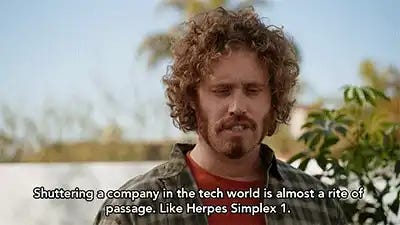I lost $209,640 of my own money trying to start a business.
Writing about failure sucks.
But here’s the real story:
Context: Me and my wife started a marketplace for last-minute tours and activities.
Think of it as Hotel Tonight x OpenTable x ClassPass. The idea was to bring live connectivity to an industry where 80% of bookings were still done using pen and paper, months ahead of time.
We worked on it for 3 years while holding down full-time jobs, burning the midnight oil on nights and weekends. The initial money came from wedding gifts, the rest from our house fund and paychecks. We moved out of a fancy high-rise and into my parents basement to plow our “rent” money into the third-party development.
During the tail end of COVID, we packed up the truck and moved our lives from the East Coast to Florida, where we could market to year round tourism. We decided to “go West, young man” (well, South) and chase our dreams.
Lesson #1: Differentiate technical risk from execution risk.
There’s a reason everyone has a clever idea for a marketplace – they don’t require you to actually build a standalone, unique product. And the technical barriers to entry are lower than high tech (like cybersecurity).
It appears simple to play middle man, connecting supply / demand in a novel way. However, it’s a long road to aggregate both sides and drive network effects. There are massive execution risks. You have to solve for two sides, not just one.
Lesson #2: Don’t be 100% dependent on someone else’s data.
Partnering with store management systems made it easier to hack the supply side, but dictated our development efforts and unit economics. We had massive platform risk. If any of our partners cut us off, we were screwed. Data couldn’t be our competitive moat, because we didn’t own it.
Lesson #3: You don’t need to build everything at once.
Building a website, Android app, and iOS app before proving product market fit was like burning money. It took us over a year to get to market, sell something, and get real feedback.
You should start small and get one platform right. Especially if you are paying someone else to do the coding. Some international developers are great value and true biz partners, while others are chop shops who will pump and dump. Speaking of that…
Lesson #4: Don’t make everything reliant on code if you can’t code.
There were 1,000 times I felt absolutely helpless, knowing what needed to be done, but not being able to jump in and fix it myself.
I’ll never depend on a 3rd party dev as the main means of production again. We would have been better off finding a technical co-founder rather than outsourcing flexibility and control.
Lesson #5: No one is going to invest in your business if you aren’t willing to quit your day job.
If you aren’t crazy enough to take the plunge, why should



